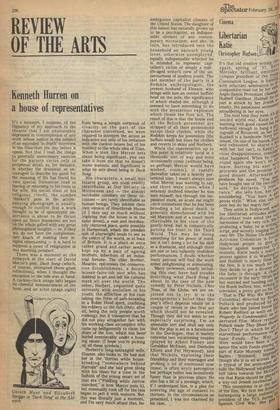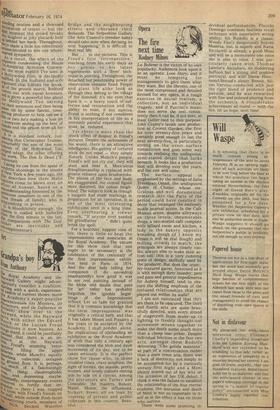It's that old creative -writing c la 5 p again, spring
of '37. Morosky, brilliant, emotiorla' campus president of the Yol Communist League, is with reluctant admiration to t, composition read out by her Will:: Anglo-Saxon Protestant classelio,' Hubbell Gardiner. Hubbell for part is struck by her Jewish tensity, the passionate seriousge' smouldering in her eyes. . th
The next time they meet,
second world war. Katie is 5" bursting with good causes but ,110.8 mellowed enough to hang 3 P:11 tograph of Roosevelt on her Hubbell is a handsome Navy l'ea" tenant. On one of his leaves, drib' and exhausted, he shares a beh, with her, but can't, to Katie s 0"( vious disappointment, reme1obe,4 what happened. When he CO. round again she won't let 11,5 leave, barring his exit '11,13 groceries and the promise oitie good dinner. Afterwards 5,i produces his novel. "You rttl have bought one of the two CO sold," he declares. "1 reati, twice," she tells him, her eYO'i smouldering. "You have a g,vtle geous style." What else can poor boy do but marry her? r They settle in Hollywood, her libertarian attitudes striK'5, discordant note amid the 01, harmonies of the very rich. She 3 sperrodiputcainngd asebcraebtyly; hloengisinwgrfitoSii easy life. The House Un-Aiher'ini Activities COmniittee is forc;e5 Hollywood people to give timony against suspected Cf,) munists. Katie leads a marePon protest against it in Washing,to and Hubbell is nearly fired 1r.rii the film. It is too much for ;er they decide to get a divorce `ce the baby is through. A cha,,r/„O encounter in the early 'fifties 1100 her married and handing out fol the Bomb leaflets; him, v,rriting television, a pretty girl On hi5 31.(4 That is The Way We Were e, Columbia) directed by SYdgfia) Pollack and produced bY ,hd Stark who last joined forces (ifiii Robert Redford as well) orl to. Property Is Condemnded, at1tiy derrated film. More rec,el/fges Pollack made They Shoot Don't They? in which he Pt of marvellous performance 011 vir Jane Fonda. The I'VaY .„tie Were would have been a better film with Fonda plaYingdOf part of Katie Morosky insteadive Barbra Streisand, in1Pre,;ut if though she is as an actress. P4t1 is typical of the ambivalent 'got tude the Hollywood establisf,111110)' still takes towards the Mc e40 era that Katie should be PIO, a way-out Jewish intellectual,:,e0 This uneasiness is at the 1,',006 of the film. We first see strel'e e5 hpraersaindegnuti nogf at nlear ygce La uddoireinncgth: Spanish Civil War. She geo -vectator February 16, 1974 ,stancling ovation and a chorused "eclaration of intent — but the !leXt moment the crowd breaks 'nt0 laughter at joky placards held ,t1,13 behind her back. Throughout, is made a little too relentlessly "kefi°os-minded to win our whole'Leaned sympathy. As a result, the effect of the s„eqi-lence condemning the House un-American Activities Committee, the most explicit I've seen in a Hollywood film, is decidedly ,414ffled. In the husband-and-wife qurnent that follows the break Of the protest march, Redford ;(Llfles out with equal honours, is given a powerful line about the Hollywood Ten serving (4it their sentences and then being taken on by some fascist, time trig producer producer to help out-o-n a 'In or two he's making a loss on lt".. everyone ending up the best of lends and the prison term all for 40thing. g is a mordant remark, con'iclering that Christopher Trumbo. ?,resomably the son of the most kous of the Hollywood Ten, g.iIPed adapt, the other offering hs week, The Don Is Dead ('X' universal). 'raking its cue from the spate of ofendetta shootings in the streets WeW York a few years ago, the In describes how three Mafia :effigies come to blows over an oll.air of honour, based on a Isunclerstanding fomented by the brnbitious cons iliere to one of the iec)htls (heads of family) who is "iguishing in prison. t
eine is bloodthirsty enough: the .
fro ma is riddled with bulletfire tri the first minute to the last. fatiLcomparisons with The Goder are inevitable and corriplimentary..



































 Previous page
Previous page